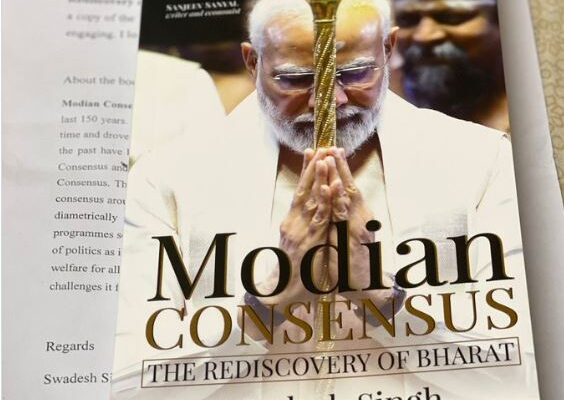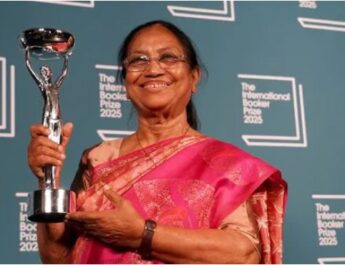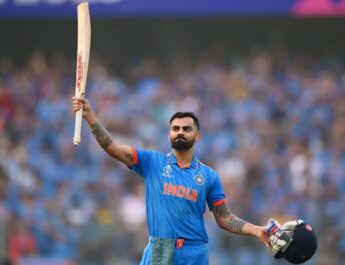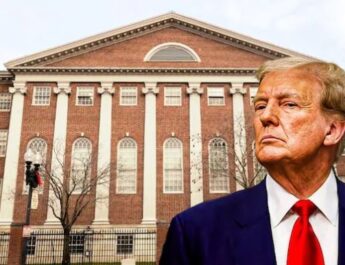Dr. Swadesh Singh’s seminal book elaborates on how PM Modi’s emphasis on assertive nationalism, cultural heritage, and a framework for social justice is driving Bharat towards becoming a Vishwa Guru.
In his influential work, “Modian Consensus: The Rediscovery of Bharat,” Dr. Swadesh Singh outlined four key agreements: ‘Civilisational Consensus,’ ‘Gandhian Consensus,’ ‘Nehruvian Consensus,’ and ‘Secular Consensus.’ Notably, the ‘Modian Consensus,’ the fifth accord, has gained prominence due to PM Modi’s significant contributions to society. This book presents a sophisticated perspective and a robust framework for understanding contemporary political shifts. Originating from collaborative think tank sessions, this book aims to revolutionize socio-political discussions in India.
The book unfolds against a backdrop of 150 years of civilizational awakening, structured into three sections and ten chapters. The initial section delves into the genesis and progression of the term ‘consensus’ within the Bharatiya context, showcasing how varied perspectives converge despite ideological disparities. This process shapes policymaking, illustrating how consensus accommodates dissent on fundamental concepts while fostering societal advancement. Dr. Singh poses a pivotal question in his preface, addressing the query of “how does a consensus cease?” The response lies in blindly replicating dominant ideologies. Emphasizing a key thesis, Dr. Singh contends that the domain of consensus evolves into a tapestry of factions, molding our governance and policies. The author astutely differentiates between consensus and unanimity in this insightful study.
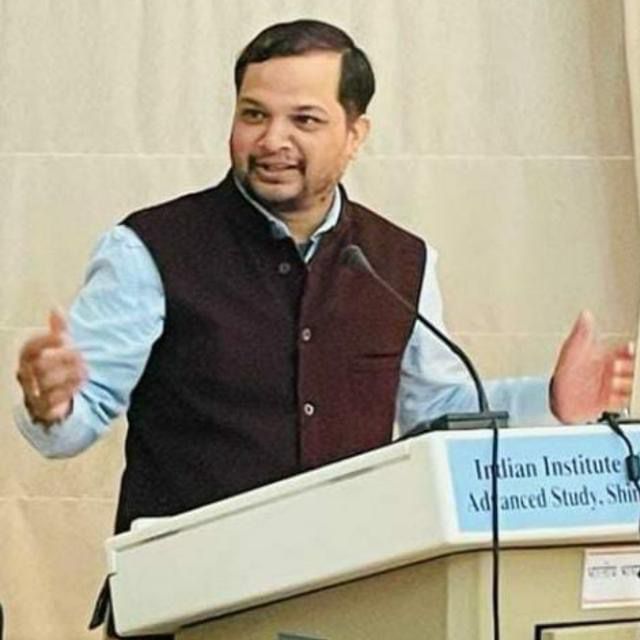
‘Gandhian Consensus’ and the ‘Civilisational Consensus.’
The book presents an engaging discourse on consensus-building preceding Indian Independence. The 1870s marked a period of collective awakening in Bharat, rejecting Western dominance. The ‘Civilisational Consensus,’ rooted in the aspirations of the Rishis or Bhadram Ichanti Rishiyah, formed the foundation of India’s independence movement, championed by Mahatma Gandhi. This section explores the intersections and disparities between the ‘Gandhian Consensus’ and the ‘Civilisational Consensus.’ The enduring quest for freedom was defined by challenging British superiority and embracing indigenous values.
The British weakened the civilisational consensus by exacerbating divisions based on class, race, and language. Dr. Singh closely examines the categories of ‘Civilisational Consensus,’ ‘Gandhian Consensus,’ ‘Nehruvian Consensus,’ and ‘Modian Consensus’ in this segment. The consolidation of the BJP under PM Vajpayee Ji’s leadership played a pivotal role, steering the narrative towards a cultural revival. The second part amplifies Prime Minister Modi’s ideological vision, emphasizing the transition from confusion to consensus following the prior administration’s instability. This section highlights the Gujarat Model of Governance, Modi Sarkar 2.0’s achievements, showcasing a significant transformation under Modi’s development-focused governance.
The British weakened the civilisational consensus by exacerbating divisions based on class, race, and language. Dr. Singh closely examines the categories of ‘Civilisational Consensus,’ ‘Gandhian Consensus,’ ‘Nehruvian Consensus,’ and ‘Modian Consensus’ in this segment. The consolidation of the BJP under PM Vajpayee Ji’s leadership played a pivotal role, steering the narrative towards a cultural revival. The second part amplifies Prime Minister Modi’s ideological vision, emphasizing the transition from confusion to consensus following the prior administration’s instability. This section highlights the Gujarat Model of Governance, Modi Sarkar 2.0’s achievements, showcasing a significant transformation under Modi’s development-focused governance.
Captivating Comparison
Dr. Singh meticulously explains how welfare programs under the banner of “Sabka Saath, Sabka Vikas” address the needs of marginalized communities. The third section delves into a nuanced exploration of the term “Modian Consensus,” marking a transformative shift in Indian politics. Dr. Singh elucidates the concept of a ‘new’ India founded on collective principles and involvement, tracing the origins and development of the Modian Consensus. The author also addresses challenges to this consensus, including deliberate attempts to discredit PM Modi and spread malicious propaganda. Dr. Singh intriguingly juxtaposes the tenures of PM Nehru and PM Modi, offering readers a captivating comparison.
Looking forward, the author addresses the path ahead by highlighting the ten years of the Modi government, which have cemented a consensus centered around Modi’s leadership. Dr. Singh stresses the importance of outlining a strategy for the significant years of 2030 and 2047. He presents a set of key objectives during this transformative period for future planning. Concluding optimistically, the author praises the revitalized spirit of Vishwa Guru Bharat under PM Modi’s guidance. The book extensively evaluates India’s political progression, PM Modi’s vision, and the foundational elements of the Modian Consensus – cultural heritage, robust nationalism, and comprehensive welfare policies. This book is highly recommended for scholars keen on exploring Indian politics, governance, and international relations.

